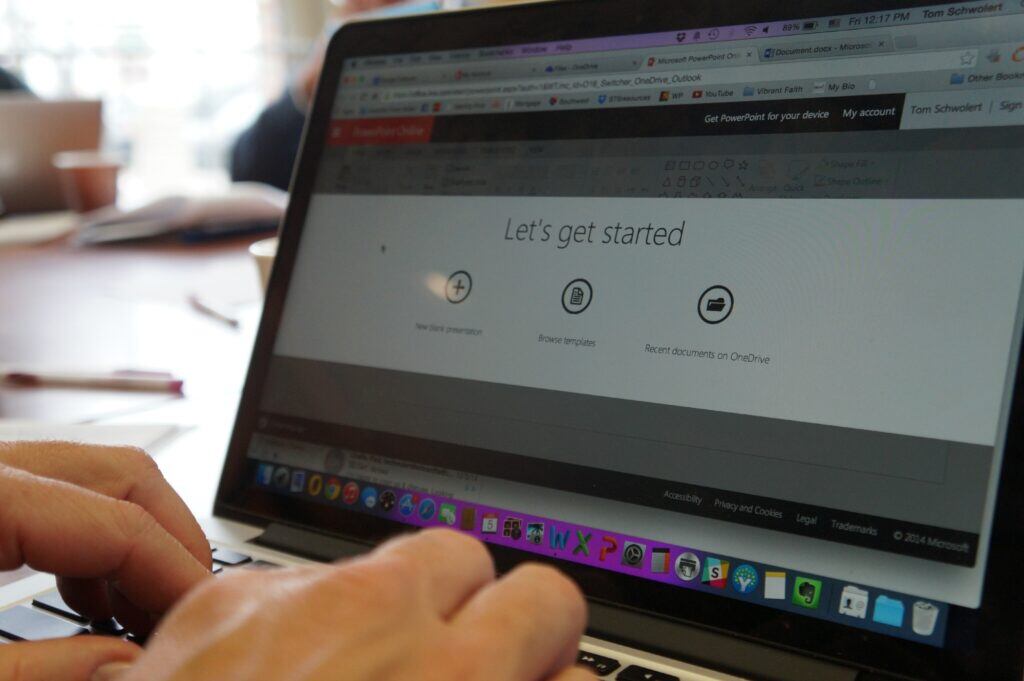
The Grift of Online Entrepreneurship
Don’t like getting underpaid for your work? Hypercapitalist Instagram meme pages can help.
I first felt the creep of real financial anxiety during the summer between my first and second years of university. My work contract was ending at the start of the coming September. But, if everything went well (and I ate nothing but instant ramen for dinner all August) I’d have saved enough that, combined with my scholarship, I could pay for another two semesters of tuition and housing (I live in Canada, where that’s still sometimes possible).
The anxiety wasn’t really about my present, but my past and my future. When I was growing up, my mother was a hairdresser and my father worked a union trade. While not exceptionally high-paying, my father’s good pay, extended benefits, and upcoming pension set my own personal standard for what a Real Job should include. The problem was that it seemed like there were no more Real Jobs like that. At least, not that I could get. I had just committed to major in communication at my university. What this degree actually meant, most people couldn’t tell me, but I did see it listed as a preference on a lot of job postings that appealed to me. Jobs like social media manager, press officer, communications director, and copywriter. None of these jobs offered anything resembling benefits. Most claimed “competitive pay” or “pay commensurate with experience.” The ones that did list pay barely cleared minimum wage, with some even being internships for school credit (unpaid internships are illegal in my province except for school credit). There was almost nothing about benefits or a pension package. The highest paying jobs, often the only ones that had benefits, required 10+ years of experience in the field and typically some kind of graduate degree.
Unable to see a situation in which my job provided the same safety net as my father’s, I concluded that I needed to look for ways to make money outside of the usual workplace. After some quick Googling, I found a ton of information from “digital entrepreneurs” who wanted to teach me how to make money while asleep. This sounded pretty good, so I downloaded a few episodes of the Smart Passive Income Podcast by Pat Flynn. At the time, it had something like 170 episodes. A cursory visit to the website today features a splashy new page that reads: “Insightful conversations with online business pros, industry experts, and more.” Farther down, a headline reads, “We’re a family of shows that gives a voice to stories, advice, and news for entrepreneurs everywhere.” There are now over 440 episodes.
Flynn, the host of Smart Passive Income (SPI) since its inception, was an architect at a solid firm until the financial crash of 2007-2008. According to him, he lost his job and had to get a new one farther away from where he lived. That required a longer commute, and he was tired of his old playlist, so he switched to business podcasts. Soon after, he noticed that a website he’d set up as a free study guide for something called the LEED exam (an architectural exam for “green” certification) was now getting thousands of hits a day. So Pat did what any self respecting entrepreneurial American would do.
He monetized it.
That decision kickstarted Flynn’s career in developing online businesses. He still puts out tons of free content, from podcasts to blog posts explaining how you, too, can become an online entrepreneur.
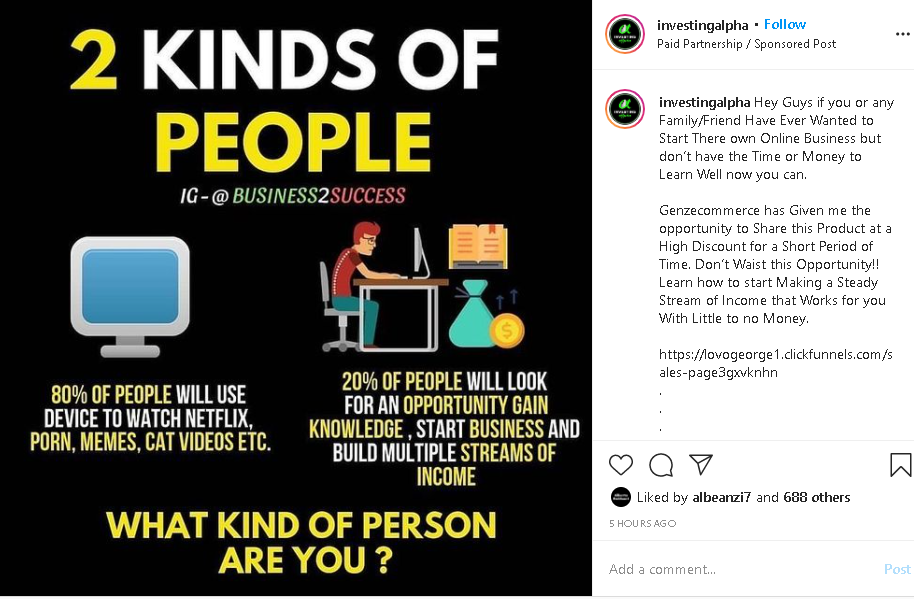
When I first found Flynn’s blog, I was skeptical. Were his tips actually successful? But he posted his income statements every month. You could see how much he made and where each dollar came from. Sure, he used affiliate marketing to make money based on positive reviews for services like web servers, and that made up the bulk of his income, but he put a disclaimer on his affiliate page explaining that he made money from them. He even said he would never recommend a product he wouldn’t use himself. Honesty was good, right?
It was through the SPI podcast that I was introduced to another entrepreneur/guru/tech bro/venture capitalist named Tim Ferriss (the current homepage still brags about having him on the show). He’s been covered in the pages of this magazine before, mainly for his willingness to platform right-wing ghouls like Charles Koch as they espouse their capitalistic dogma with little-to-no pushback.
Ferriss got his start in business by launching a successful supplement in 2001 called BrainQUICKEN, which is exactly what it sounds like: a pseudo-scientific bullshit nootropic that Joe Rogan would probably try to sell to his listeners today. Like Flynn, Ferriss leveraged that early success into a series of projects that have made him a lot of money. His most popular products are his series of self-help/entrepreneur books: The 4-Hour Workweek, The 4-Hour Body, and The 4-Hour Chef.
The 4-Hour Workweek was Ferriss’ first published book and helped him gain recognition in a burgeoning publishing market hungry for get-rich-extremely-quick garbage. Nevertheless, I thought that working four hours a week sounded splendid. After hearing Ferriss talk on SPI, I went out and bought a copy.
It’s not surprising that the book was a hit for anxious 20- and 30-somethings like me who felt trapped by modern economic conditions. It speaks to a specific type of insecurity and offers a tempting escape route: the fantasy of owning a business that can be operated from a remote location, allowing you to travel the world while working four hours or less per week.
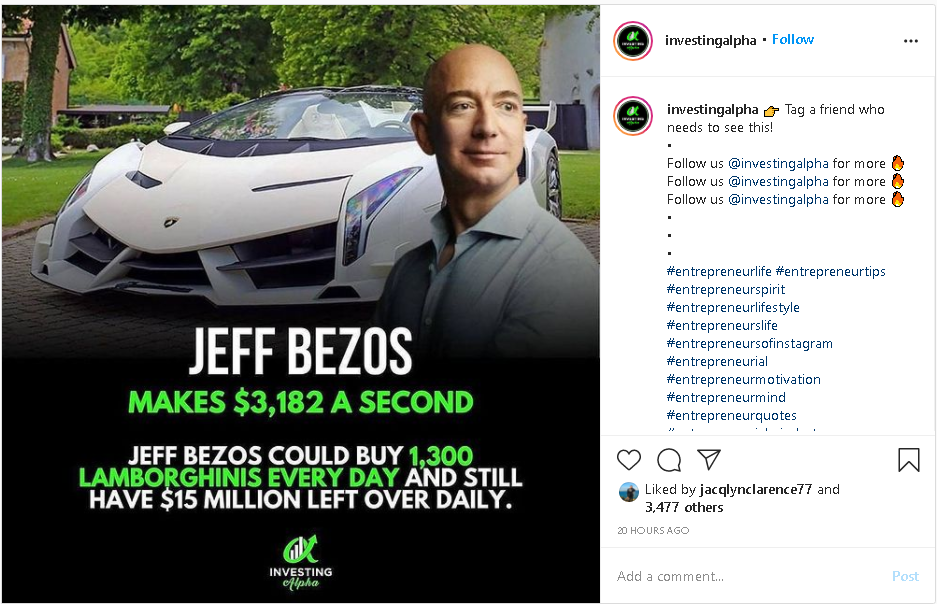
In the same way that Pat Flynn often provides actual, actionable advice, Ferriss isn’t exactly peddling bullshit in his book. The 4-Hour Workweek isn’t like a lot of business books that speak in platitudes and abstracts. It’s certainly possible to get to the point where your business operates on little-to-no input from you (all the more reason for your workers to liberate the business from you, in my opinion). Ferriss is actually radically honest about the limited amount of input that’s needed from a business owner and unashamedly suggests that people exploit asymmetrical labour relations. His advice can be neatly summed up as follows:
- Pick a product you can produce cheaply.
- Sell it online since there’s almost no startup cost.
- Automate as much of the business as possible once you gain traction while unloading the rest of the work onto a virtual assistant from the global south that you can pay $4 an hour. (There are even bonus tips about how you can pay workers less if you need to!)
The success of digital entrepreneurs like Flynn, Ferriss, and others has spurred a new wave of entrepreneurial hopefuls attempting to copy their success. My Instagram “Explore” page is flooded by business inspiration and meme pages that all churn out a specific type of post (it doesn’t help that I share them with my friends to revel in the ridiculousness, thus triggering Instagram’s algorithm to let it know that I would like to see more).

These pages all try to operate the same business model that Flynn and Ferriss use. They build up a trusting audience by providing actually useful free content (blog posts, podcasts) that contain basic advice about personal finance, entrepreneurship, and fitness, then funnel people toward premium courses or books that can help them get “to the next level.” The information in the premium resources doesn’t even need to be new. In one episode of his podcast, Flynn explains that you can simply repackage old blog content into books because people are willing to pay for convenience.
Many of these Instagram business pages follow the Flynn/Ferriss formula so closely that if you told me they were all run by the same person or algorithm, I wouldn’t be surprised. The images always contain a suggestion to follow the business account, at least one typo, and a watermark to make sure that they get credit once the image is recycled. I’ve seen hundreds of these posts and I’ve learned a few things about them.
First, nobody who creates these pages knows what they’re doing. In their haste to hop on the coaching/consulting/grifting gravy train, most of these people have failed to replicate the trajectories of successful online entrepreneurs by skipping the first step of actually having a successful business. We’re left with a mess of posts where lack of experience makes concrete advice (of the type that makes Flynn and Ferriss actually interesting) is almost impossible to find. This reduces these baby entrepreneurs’ so-called business advice to tired platitudes repeated across posts and accounts, with each account then commenting on each other’s posts as a way to boost each other’s popularity. It’s a prime example of oversaturation in a market with a low barrier of entry caused by the commodification of anything and everything, including advice or simply the existence of an online presence.
The second, and far more important thing, is the language used in these posts. In many ways, it replicates the sales language used by more successful entrepreneurs in books, podcasts, and elsewhere. They target the pain points of the financially insecure, the kinds of vulnerabilities I was experiencing years ago when I first found Smart Passive Income.
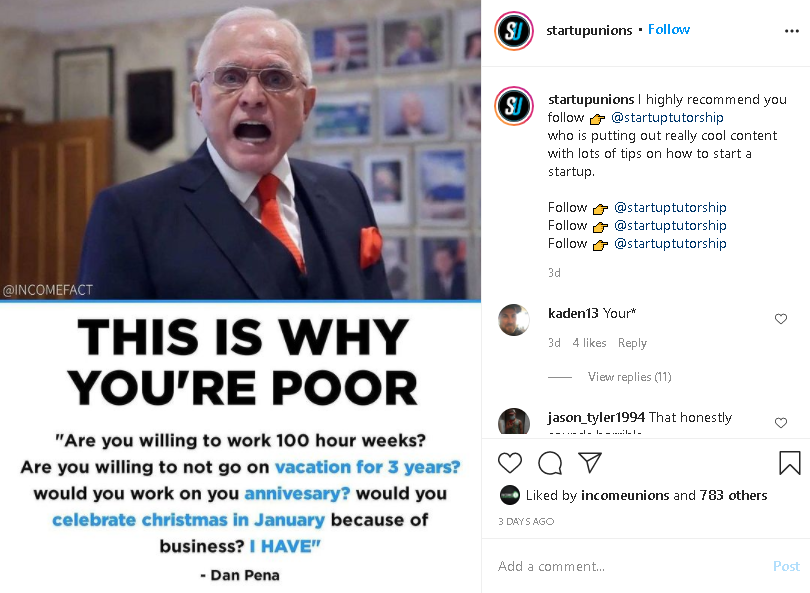
Feel unappreciated by your boss? Anybody can become their own boss in the digital age. Think your labour is undervalued? Take control of it for yourself. Feel scammed by the 9:00 to 5:00 grind? That’s because it is a scam! But the only way to get out of it is to have your own business where you pay other people to work 9:00 to 5:00 instead and you enjoy $5 breakfasts in Buenos Aires! (This is a real section of The 4-Hour Workweek.)
In other words, online entrepreneurs use socialist-adjacent framing to appeal to people who feel helpless in a society that has abandoned any semblance of mutual care. Many people want safe, secure, non-exploitative work and a safety net to take care of them when they are sick or grow old, and entrepreneurs validate their unhappiness and insecurity. But rather than stepping back to examine the structures of exploitation and material relations that facilitate these problems, or considering what structural changes could improve people’s lives on a grand scale, these would-be financial sages download the responsibility of solving it onto the individual.
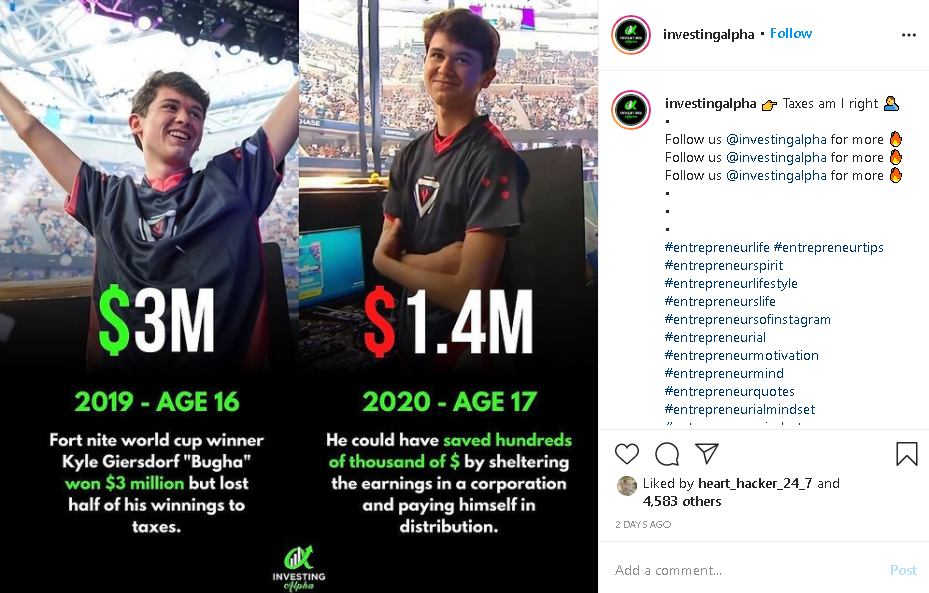
The institutions of capitalism have long been skilled at co-opting resistance messaging, and here it’s no different. Rather than offering any sort of meaningful solution, these financial gurus repackage the core complaints of free market capitalism and sell them back to people to reproduce the same conditions elsewhere that they’re desperate to escape themselves.
Don’t like getting underpaid for your work? Start your own online business and underpay someone else to do 90 percent of the work!
All of this is merely the logic of capitalism distilled. Digital entrepreneurship offers a path out of the hellscape of the modern economy, so long as you’re willing to subject someone else to the same or worse conditions. There are entire communities of these entrepreneurs, working together to share information, give advice, and get ahead. All you need to do to get in is buy The Elite High Performance Business Funnel Generator Course™ for four easy payments of $999.

Essentially, digital entrepreneurs are pretending to give you the same thing socialists do. They want you to believe that they can give you the keys to a better, freer life, control over your work, non-exploitative working conditions, more free time, and a community you can rely on. You simply need to pay for it, and be willing to hurt other people to get your ticket to membership in an elite club. Someday, if you grind hard enough and buy enough eBooks and courses, you can be free and happy. But freedom and happiness are only suitable for those who make it into the elite club—to hell with everyone else.




